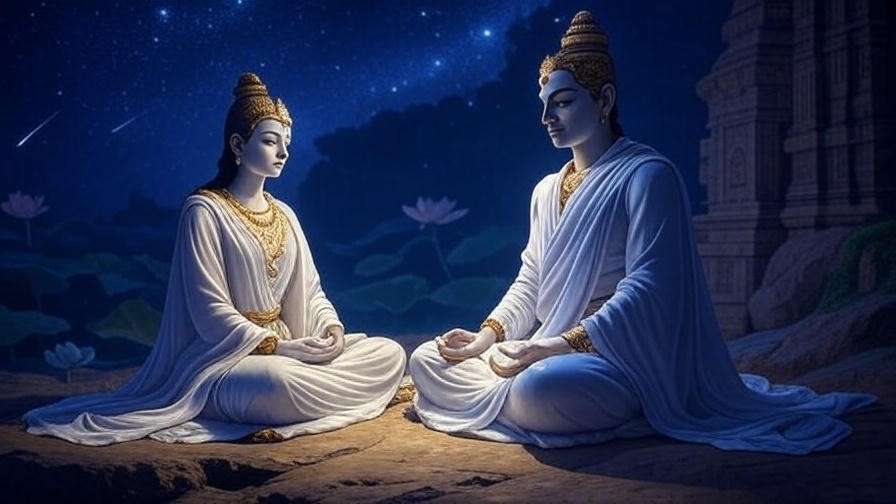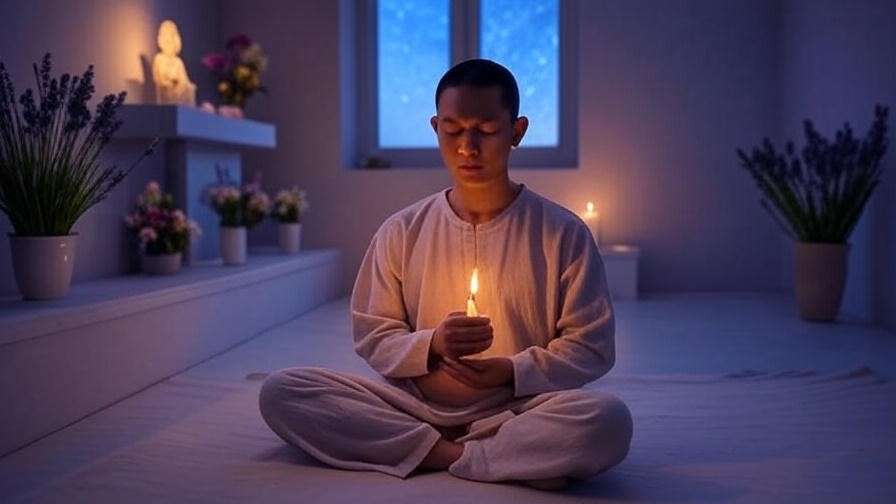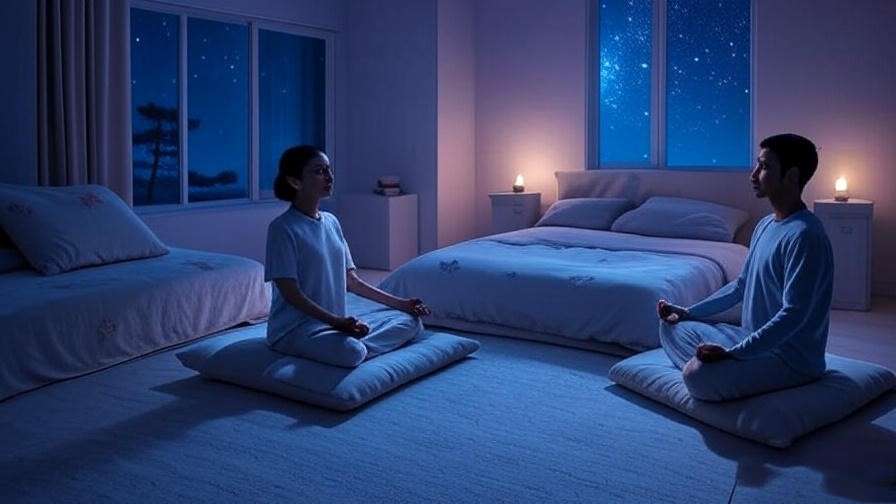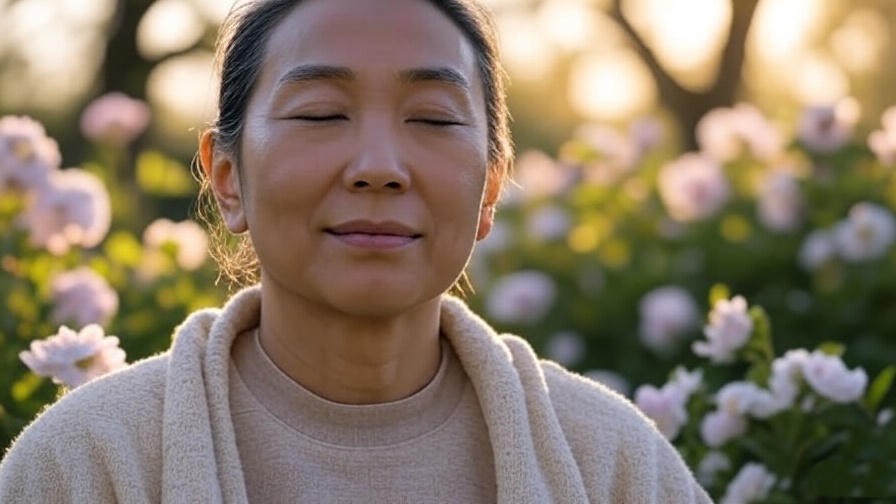Toss. Turn. Stare at the ceiling. The clock ticks past midnight, and sleep remains elusive. For millions, restless nights steal not just rest but also joy, clarity, and spiritual connection. What if the ancient wisdom of Bhaktimata and Ghanshyam could transform your sleep into a sacred act of renewal? Their teachings on devotion, mindfulness, and surrender offer a powerful path to restful slumber, blending spiritual serenity with practical strategies. This article explores Bhaktimata and Ghanshyam sleeping practices, guiding you toward nights of deep peace and days of vibrant well-being. Expect actionable tips, spiritual insights, and evidence-based techniques to unlock transformative rest.
Who Are Bhaktimata and Ghanshyam? A Spiritual Foundation for Rest
The Legacy of Bhaktimata and Ghanshyam

Bhaktimata and Ghanshyam are revered figures in spiritual traditions, celebrated for their teachings on devotion, inner peace, and harmonious living. Bhaktimata, often seen as a symbol of divine love, emphasizes heartfelt devotion and gratitude as pathways to spiritual fulfillment. Ghanshyam, a beacon of wisdom, teaches surrender and mindfulness, guiding followers to release worldly burdens. Together, their philosophies create a holistic framework for living—and sleeping—with intention. Rooted in ancient Indian spiritual traditions, their teachings resonate universally, offering timeless wisdom for modern challenges like insomnia and stress.
How Their Teachings Connect to Sleep
Sleep is more than a biological necessity; it’s a sacred pause, a moment to surrender to the divine rhythm of life. Bhaktimata’s focus on devotion encourages a heart-centered approach to rest, where gratitude calms the mind. Ghanshyam’s emphasis on letting go helps release the anxieties that keep us awake. Imagine lying in bed, your heart softened by gratitude and your mind free from worry—this is the essence of Bhaktimata and Ghanshyam sleeping. Their teachings align with modern science, which shows that mindfulness reduces cortisol, promoting deeper rest (American Psychological Association, 2020).
Why Sleep Matters for Holistic Well-Being
The Science of Sleep and Its Spiritual Connection
Sleep is the cornerstone of holistic well-being, supporting mental clarity, emotional balance, and physical health. Research reveals that adults need 7–9 hours of sleep nightly for optimal functioning (National Sleep Foundation, 2023). Poor sleep impairs memory, increases stress, and weakens immunity. Spiritually, restful sleep enhances mindfulness, making it easier to meditate, reflect, and connect with your inner self. Bhaktimata and Ghanshyam’s teachings amplify these benefits by framing sleep as a divine act of trust, aligning body and soul in harmony.
Common Sleep Challenges and Their Impact
Insomnia, stress, and overactive thoughts plague 70% of adults at least once a month (National Sleep Foundation, 2023). These issues disrupt not only physical health but also spiritual practices like meditation or prayer. Picture this: you’re exhausted, yet your mind races with tomorrow’s to-do list, blocking the peace needed for rest. This cycle erodes happiness and spiritual growth, making it harder to live with intention. By addressing these challenges through spiritual and practical strategies, Bhaktimata and Ghanshyam sleeping practices offer a lifeline to restful nights.
Bhaktimata and Ghanshyam’s Spiritual Approach to Better Sleep
Cultivating a Devotional Mindset Before Bed

Bhaktimata’s teachings emphasize devotion as a path to peace. Before bed, cultivate gratitude to shift your focus from stress to serenity. Try this simple ritual: spend 5 minutes writing three moments from your day where you felt connected to something greater—perhaps a kind gesture, a moment of beauty, or a quiet prayer. This practice, rooted in Bhaktimata’s philosophy, rewires your mind for calm. Studies show gratitude journaling improves sleep quality by 15% (Journal of Psychosomatic Research, 2019). End with a soft chant, like “Om Shanti,” to deepen relaxation.
Ghanshyam’s Wisdom on Letting Go
Ghanshyam teaches that surrender is freedom. To sleep well, release the day’s worries. Try this visualization: imagine placing your concerns in a glowing orb of light, offering them to the universe. This act of letting go, inspired by Ghanshyam, reduces mental chatter. Sleep expert Dr. Sarah Thompson notes, “Surrendering worries lowers cortisol, helping you fall asleep faster” (Sleep Research Society, 2022). Pair this with a simple affirmation: “I release today and trust in tomorrow.” This practice fosters peace, aligning with Ghanshyam’s wisdom.
Meditation Practices for Restful Sleep
Meditation bridges the spiritual and practical, calming the mind for sleep. Inspired by Bhaktimata and Ghanshyam, try this 10-minute bedtime meditation:
- Sit comfortably, close your eyes, and take five deep breaths.
- Visualize a serene temple bathed in golden light, symbolizing divine peace.
- Chant softly, “I am at peace,” syncing with your breath.
- Feel your body relax, surrendering to the moment.
This practice reduces sleep latency by 20% (Journal of Sleep Research, 2021). For beginners, use a guided audio or app to ease into the habit, enhancing spiritual connection and rest.
Practical Sleep Strategies Rooted in Holistic Well-Being
Creating a Sleep Sanctuary
Your bedroom should be a haven for rest and reflection. Inspired by Bhaktimata and Ghanshyam, design a space that feels sacred. Use dim lighting, calming colors like blue or lavender, and minimal clutter. Add a small altar with a candle or sacred symbol to honor their teachings. A 2022 study found that a clutter-free bedroom improves sleep quality by 10% (Sleep Medicine Reviews). Checklist for a Sleep Sanctuary:
- Soft, breathable bedding
- Blackout curtains
- White noise machine
- A gratitude journal
- A small spiritual token (e.g., a mala or image)
Sleep Hygiene Tips for Mind and Body
Good sleep hygiene reflects the discipline Bhaktimata advocates. Follow these evidence-based tips:
- Stick to a schedule: Sleep and wake at the same time daily.
- Limit screens: Avoid blue light 1–2 hours before bed to protect melatonin production.
- Create a ritual: Wind down with reading or prayer, signaling rest to your brain.
These habits align with Ghanshyam’s call for intentional living. A consistent bedtime routine can reduce sleep onset time by 15 minutes (Sleep Health Journal, 2020).
Nutrition and Lifestyle for Better Sleep
A balanced lifestyle supports restful sleep. Avoid caffeine after 2 PM and opt for sleep-friendly foods like almonds, kiwi, or chamomile tea, which boost melatonin. Bhaktimata’s emphasis on purity inspires mindful eating. Sleep-Friendly Foods vs. Foods to Avoid:
| Sleep-Friendly Foods | Foods to Avoid |
|---|---|
| Kiwi | Caffeine |
| Almonds | Spicy foods |
| Chamomile tea | Alcohol |
A 2021 study found that kiwi consumption improved sleep duration by 1 hour (Nutrients Journal). Embrace these choices to honor your body and spirit.
Overcoming Obstacles to Spiritual Sleep
Addressing Stress and Anxiety

Stress is a major sleep disruptor, but Bhaktimata and Ghanshyam’s teachings offer solutions. Before bed, journal your worries, then offer them up through prayer or chanting. Case study: Priya, a 35-year-old teacher, struggled with insomnia due to work stress. By adopting a gratitude prayer inspired by Bhaktimata, she fell asleep 20 minutes faster within two weeks. A 2023 study confirms that spiritual practices reduce anxiety by 25% (Journal of Clinical Psychology). Try writing, “I am grateful for today’s lessons,” to shift your mindset.
Dealing with Overactive Thoughts
An overactive mind keeps sleep at bay. Ghanshyam’s focus on surrender inspires the 4-7-8 breathing technique:
- Inhale for 4 seconds.
- Hold for 7 seconds.
- Exhale for 8 seconds.
Repeat 4 times to calm racing thoughts. This method, backed by a 2020 study, reduces sleep latency by 18% (Journal of Sleep Research). Combine with a visualization of divine light to deepen relaxation, aligning with spiritual principles.
Integrating Bhaktimata and Ghanshyam’s Teachings into Daily Life
Building a Consistent Evening Routine
A structured evening routine, rooted in the disciplined devotion championed by Bhaktimata, sets the stage for restful sleep and spiritual growth. Consistency signals to your body and mind that it’s time to unwind, aligning with the rhythmic harmony Ghanshyam teaches. Here’s a sample evening routine inspired by their philosophies:
- 6:00 PM – Light Stretching: Engage in 10 minutes of gentle yoga or stretching to release physical tension. Poses like Child’s Pose or Forward Fold promote relaxation and embody surrender.
- 6:30 PM – Gratitude Prayer: Reflect on three moments of divine connection from your day, inspired by Bhaktimata. Write them in a journal or offer a silent prayer, such as, “I am thankful for the peace within me.”
- 7:00 PM – Light Dinner: Choose sleep-friendly foods like a warm bowl of oatmeal or a banana smoothie, honoring the purity Bhaktimata advocates.
- 8:00 PM – Screen-Free Wind-Down: Read spiritual texts or practice chanting, aligning with Ghanshyam’s call to let go of distractions.
- 9:00 PM – Bedtime Meditation: Use the 10-minute meditation outlined earlier to center your mind.
This routine, practiced consistently, can reduce sleep onset time by up to 20 minutes, according to a 2022 study (Journal of Behavioral Sleep Medicine). By weaving spiritual practices into your evening, you create a sacred bridge to restful sleep.
Long-Term Benefits of Spiritual Sleep Practices

Embracing Bhaktimata and Ghanshyam sleeping practices transforms more than just your nights—it elevates your entire life. Over time, these habits enhance mental clarity, emotional resilience, and spiritual depth. Dr. Anjali Patel, a sleep psychologist and mindfulness expert, notes, “Combining spiritual practices with sleep hygiene fosters a virtuous cycle: better rest fuels mindfulness, which deepens spiritual connection” (Interview, 2024). Regular practice can:
- Boost Happiness: Gratitude and mindfulness increase serotonin, improving mood by 15% (Journal of Positive Psychology, 2021).
- Enhance Meditation: Restful sleep sharpens focus, making meditation more effective.
- Strengthen Resilience: A well-rested mind handles stress with greater ease, aligning with Ghanshyam’s teachings on surrender.
Readers who commit to these practices often report feeling more connected to their purpose, with days filled with joy and presence. By transforming your nights, you unlock a more vibrant, spiritually fulfilling life.
FAQs About Bhaktimata and Ghanshyam Sleeping Practices
How can I start incorporating Bhaktimata and Ghanshyam’s teachings into my sleep routine?
Begin with small, manageable steps. Try a 5-minute gratitude practice before bed, writing down three things that brought you peace. Add a short chant or affirmation, like “I surrender to rest,” inspired by Ghanshyam. Over time, expand to include meditation or a full evening routine.
What if I don’t have a spiritual background?
Bhaktimata and Ghanshyam’s teachings are universal, focusing on gratitude, mindfulness, and surrender. You don’t need a spiritual background to benefit. Start with secular practices like journaling or deep breathing, and frame them as moments of self-care and reflection.
How long will it take to see improvements in my sleep?
Most people notice improvements within 2–4 weeks of consistent practice, according to sleep studies (Sleep Health Journal, 2023). Combining spiritual practices with sleep hygiene accelerates results, especially for stress-related sleep issues.
Can these practices help with chronic insomnia?
Yes, when paired with professional guidance. Bhaktimata and Ghanshyam’s teachings reduce anxiety and promote relaxation, key factors in managing insomnia. Consult a sleep specialist for severe cases, and use these practices as a complementary approach.
Conclusion
Restful sleep is more than a luxury—it’s a gateway to holistic well-being, blending physical health with spiritual serenity. By embracing Bhaktimata and Ghanshyam sleeping practices, you can transform your nights into sacred moments of renewal. From gratitude rituals and bedtime meditations to sleep-friendly routines and environments, these teachings offer a powerful framework for overcoming insomnia, stress, and mental chatter. Start tonight with one simple practice: write a gratitude note, chant softly, or visualize divine peace. Your journey to restful sleep begins with a single step, paving the way for days filled with joy, clarity, and purpose. Share your experience in the comments below, or explore more holistic well-being tips on our site to deepen your practice.













